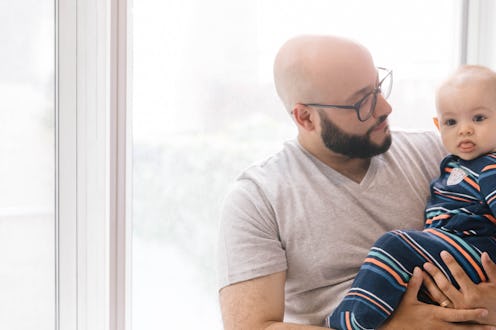News
The Surprising Sexism of Maternity Leave

Many Americans still think of parental leave as a "woman's issue," but Derek Rotondo, a employee at JPMorgan Chase, is determined to change that. On Thursday, the American Civil Liberties Union filed a complaint with the Equal Employment Opportunity Commission on behalf of Rotondo, alleging that JPMorgan Chase is engaging in gender discrimination by providing 16 weeks of maternity leave but only two weeks of comparable paternity leave.
“JPMorgan’s parental leave policy is outdated and discriminates against both moms and dads by reinforcing the stereotype that raising children is women’s work, and that men’s work is to be the breadwinner,” Galen Sherwin, the ACLU’s Women’s Rights Project's senior staff attorney, said in a statement.
It may seem a little rich for a man to allege discrimination for not getting enough paternity leave — especially when the United States is still one of only two countries in the world that doesn't guarantee paid maternity leave, with 1 in 4 women returning to work 10 days after giving birth, according to the nonprofit PL+US (Paid Leave for the United States).
However, according to experts in gender law, not only does Rotondo have a good case, but victory for the ACLU could lead to big changes leading to a more equal workplace.
"I'm frankly surprised that a company as large as JPMorgan would have a policy like this in this day and age," Vicki Schultz, Ford Foundation Professor of Law and Social Science at Yale Law School, tells Bustle.
She points to a 2003 Supreme Court case, Nevada v. Hibbs, which already found that gender discrimination law could apply to unequal parental leave policies. And the 2015 guidance on pregnancy by the EEOC states that "parental leave must be provided to similarly situated men and women on the same terms."
It's possible that JPMorgan could just settle the case with the EEOC and change their family leave policy. But if the case makes it to court and fights its way up through through the system, it could have a profound effect on how family leave policies are implemented at companies nationwide.
"Providing equal parental leave to men and women is an important step in trying to get at a lot of cultural stereotypes and starting to chip away at the assumption that women do and should bear the primary responsibility for caregiving," Maya Raghu, Director of Workplace Equality and Senior Counsel at the National Women’s Law Center, tells Bustle.
"Part of the reason you're seeing an increase in lawsuits brought by men on these issues, on caregiving, is because more and more men are interested in being caregivers and taking on that responsibility or being present in their family's lives in a way that they weren't necessarily before or that society expected them to be before," Raghu notes.
The paternity fight may even be a sign of larger societal change. "Legal and cultural change often go hand in hand. One pushes the other," Raghu says.
The effect of more men involved as primary caregivers for raising children could have powerful effects not just for those men, but for the women who would no longer be expected to put their careers on hold to take care of children. Research has suggested time and again that the breaks in work from caregiving — usually experienced more by women than men — contribute to the gender wage gap. Some experts hope that equalizing how workplaces and culture treat men as caregivers could have impact on minimizing that gap.
"Feminist theorists believe that this is really kind of the crux," says Tracy Thomas, John F. Seiberling Chair of Constitutional Law at the University of Akron School of Law and Editor of the Gender and Law Professors Blog. "Right now, a lot of the formal inequalities between men and women since the 1970s have sort of been eliminated in the workplace — as far as different rules, different hours, different wages."
However, the reality is often more complicated than the workplace laws on the book. "A lot of the cases really pushing the theory of gender discrimination right now are at this question of family and parenting and maternity leave," says Thomas. "So if we were to extend it across the board, I think that could be potentially very big in changing [the situation]. Because that's where we've identified we're culturally stuck. We're still stuck on women taking care of kids."
The potential of men taking full advantage of status as equal caregivers could also change the way these policies are treated in workplaces once they are universal. "I think that we're going to learn about a lot more forms of caregiver discrimination that we don't know about at this point," says Schultz.
She points to potential complaints about missing out on promotions or raises once men take more time away from work. Women have complained about these issues for years, but with men alongside them taking advantage of the policies, there could be even more impetus to fix workplace policies.
"There's a whole array of things that goes with providing care, ways in which people can be punished in the workplace for taking advantage of formal entitlements that exist," says Schultz. "I think we're going to increasingly see men challenging."